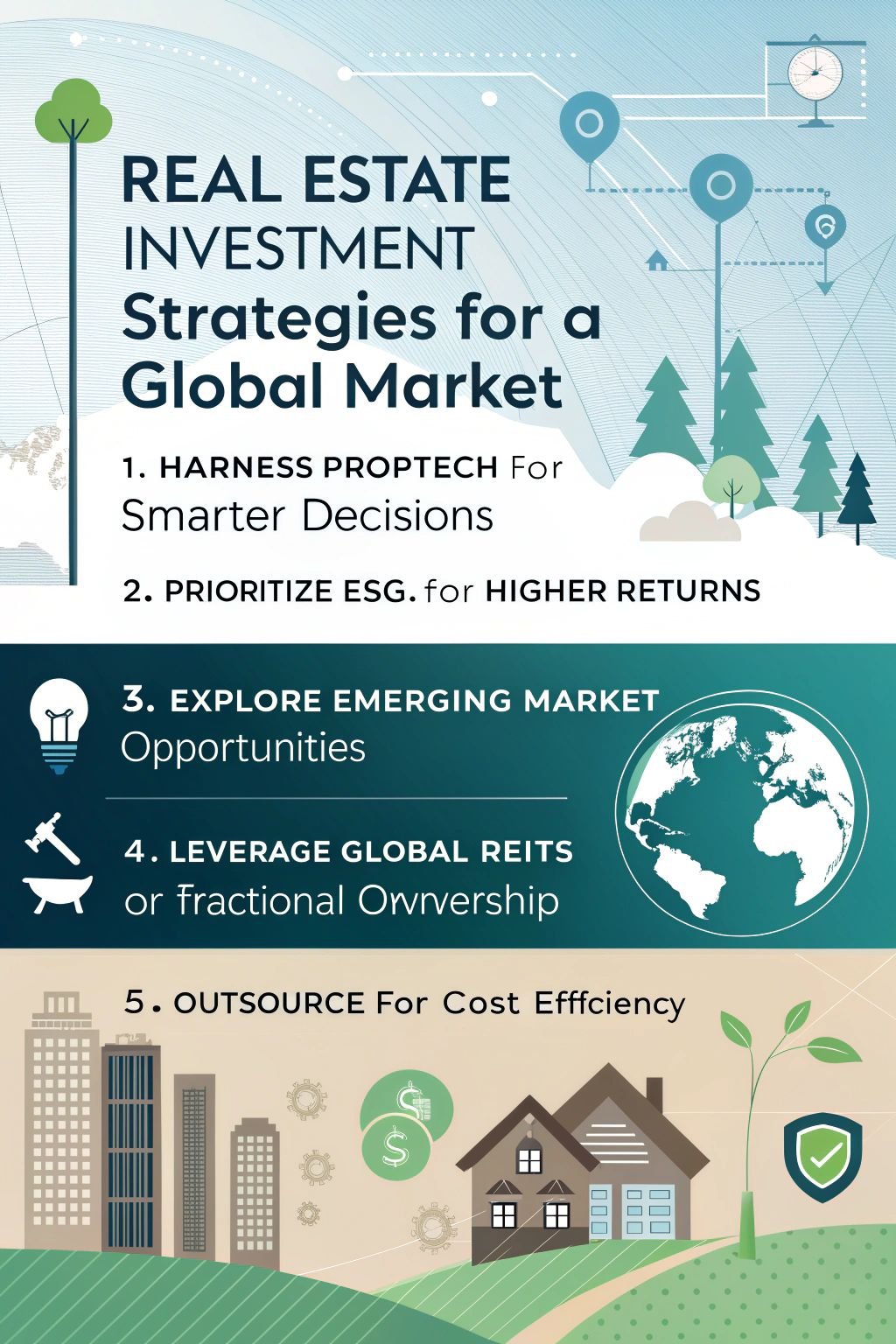Investing in real estate across the globe can seem overwhelming. Markets shift, financing costs rise, and finding the right strategy gets tough. With economic uncertainty and unpredictable interest rates, you may feel unsure about taking your next step as an investor.
These challenges make it harder to spot profitable opportunities in a rapidly changing market.
Smart strategies can help you approach this space with confidence. For instance, over 50% of real estate CFOs expect higher capital costs in the coming year—making smart planning critical for success. 1 This guide will show you how to make use of technology, explore new markets, and focus on sustainable investments to grow your portfolio globally. 2
Prepare to elevate your investment approach! 3
Key Takeaways
- Use PropTech and Data Analytics: Real estate investors can use innovations like PropTech and data analytics for better decision-making. Tools provide insights into property trends, valuations, and risk mitigation. For example, only 13% of firms use real-time intelligence today—offering early adopters a competitive advantage. 2
- Focus on Sustainability: ESG investments enhance returns while achieving climate goals. Eco-friendly properties attract premium tenants with 3%-4% rent increases. Grade A U.S. offices see a 31% rent hike due to sustainability ratings when adjusted for age factors. 4
- Explore Emerging Markets: Sun Belt cities like Miami or Phoenix are thriving due to tech growth and infrastructure projects, offering high potential combined with low entry costs for investors. Population growth also increases demand in target areas worldwide. 19
- Utilize Investment Structures: Global REITs provide liquidity and steady dividends by distributing at least 90% of their income annually to shareholders across $2 trillion market capitalization globally as of December 2023. 814 Fractional ownership also reduces barriers.
- Outsource Tasks Strategically: Over 61% of companies outsource operational roles within real estate, lowering CPA expenses by up to half through platforms like Agora while streamlining portfolio tasks during market changes. 5

Real Estate Investment Strategies for a Global Market

Investing globally requires a combination of effective strategies and market understanding. Discover how tools like data analytics and sustainable options can improve your property investments.
Embrace PropTech Innovations
PropTech simplifies complex real estate processes. It enables you to replace outdated systems with streamlined digital solutions. Tools like predictive analytics and business intelligence can provide insights into property values, market trends, and rate of return projections.
Using these technologies equips you to face challenges such as restricted capital access or increased costs in 2024. 1
Smart platforms boost efficiency for real estate investors. For instance, investor management software helps track expenses, monitor net asset value (NAV), and assess your portfolio’s performance accurately.
AI-powered tools also identify economic risks while forecasting price changes more effectively than manual methods.
“Innovation driven by PropTech is not optional—it’s essential for staying competitive.” 1
Leverage these advancements to secure a strong edge in emerging markets or niche segments while mitigating financial risks like vacancy losses or liquidity issues.
Harness Data Analytics
PropTech tools have transformed how investors approach properties. Now, data analytics enhances your ability to make well-informed decisions. Only 13% of real estate companies use real-time business intelligence today, giving you a chance to gain a competitive advantage by adopting it early. 2
Use data analytics for accurate valuations and assessing rent premiums. Identify profitable opportunities by studying supply-demand trends in potential markets. Spot emerging areas with rising value or hidden revenue streams before competitors take action.
Improve risk mitigation strategies using insights from analytics. Analyze environmental risks like climate impact on property values or carbon reduction targets more effectively. This approach protects investments while aligning with Environmental, Social, and Governance (ESG) priorities that attract modern buyers and tenants.
Utilize Real Estate Investor Management Software
Data analytics can guide your investment decisions, but managing relationships and workflows requires the right tools. Real estate investor management software helps you simplify CRM, handle document management, and build stronger investor relations efficiently.
Tyler Basset of Helu Capital boosted equity raised by three times using Agora’s software—a clear example of its effect on results.
The market for Investment Management Software in real estate was worth $7.2 billion in 2022. 3 Experts project it will grow to $12.3 billion by 2030, reflecting its growing significance in global property investments.
Using this technology provides better control over communications while saving time on routine tasks—key advantages for expanding portfolios or pursuing passive income strategies effectively.
Make Sustainable and Eco-Friendly Investments
Choose properties that satisfy ESG (Environmental, Social, and Governance) criteria. Investing in sustainable buildings can increase returns and attract premium tenants. For example, Deloitte reports a 3%-4% rent premium for eco-friendly spaces.
U.S. Grade A offices with strong sustainability ratings see a 31% increase in rents when adjusted for factors like age.
Focus on projects emphasizing decarbonization. About 34% of real estate leaders are already adopting this approach to improve long-term value creation. Green investments improve property values while also reducing climate risks and meeting market demand for cleaner options. 4
Sustainability is key to resilience and future-proofing your portfolio.
Explore Emerging Markets and Areas
Target cities experiencing rapid growth like Miami, Phoenix, and Dallas/Fort Worth. 1 Sun Belt markets attract investors due to tech expansions, healthcare growth, and government infrastructure projects.
These areas provide strong economic potential combined with relatively lower entry costs for real estate investments.
Examine population increases when evaluating emerging markets. Cities with an expanding workforce or new industry hubs often experience higher demand for housing and commercial spaces.
Prioritize regions making advancements in public transportation and renewable energy solutions since these factors increase property values over time.
Outsource Key Tasks to Third-Party Specialists
Outsourcing specific tasks can save you time and cut costs. Over 61% of businesses plan to outsource operational activities within the next 12-18 months. 5 By hiring third-party specialists, you gain access to focused expertise without needing in-house staff for every role.
Tasks like property tax management, accounting, or even risk analysis become more efficient with skilled professionals handling them.
Using services like Agora reduces CPA costs by up to 50%. This approach ensures your finances are managed at a lower price point while maintaining accuracy. Outsourcing also helps simplify portfolio management and keeps investors confident in your operations during economic shifts or market changes. 5Leverage Tax Abatements
Managing real estate investments globally requires smart strategies, especially for enhancing profitability. Tax abatements provide an excellent way to boost cash flow and increase property value significantly.
For example, $1 million in added cash flow helped raise a Dallas property’s valuation from $70 million to $84 million. 6
Research state-specific tax abatement programs customized to your investment needs. Partner with experienced investors who thoroughly understand these initiatives. These steps maximize your returns while easing financial strain on large projects or developments.
Invest in Fractional Ownership
Investing in fractional ownership enables you to own portions of high-value properties with reduced financial barriers. Platforms like Arrived enable you to earn dividends from rental income without needing significant upfront capital.
For example, you can begin investing in real estate for as little as a few hundred dollars, making it accessible even if you’re inexperienced in the market. 7
Research properties and markets thoroughly before committing funds. Spread investments across multiple locations or property types to lower risks associated with market volatility or economic changes.
Knowing exit strategies ensures smoother transitions when you decide to sell your shares later on. Next, consider specific markets that match your investment goals.
Focus on Niche Markets and Segments
Targeting niche markets helps you uncover hidden opportunities in real estate. Cities like Baltimore, Columbus, and Gainesville offer strong “Eds and Meds” sectors with steady demand for housing. 1 Visitor hubs such as Las Vegas and Orlando attract tourists throughout the year, making short-term rental properties a profitable choice. Areas near military bases often see consistent rental needs due to frequent relocations.
Smaller specialized markets like Chattanooga or Des Moines provide affordable entry points with potential for growth. 1 These regions often have lower property prices but rising demand from younger buyers or retirees looking for quieter lifestyles.
Focusing on these segments minimizes exposure to market fluctuations while presenting unique investment options.
Consider buying a REIT next to diversify your portfolio without direct ownership complications.
Explore Buying a REIT
Consider purchasing a REIT to invest in real estate without owning property directly. Real Estate Investment Trusts (REITs) offer access to income-generating assets like apartment complexes, offices, and warehouses.
With more than 940 listed globally as of December 2023, REITs hold an equity market capitalization of $2 trillion. Many focus on specific industries such as healthcare or industrial sectors, both expected to grow despite economic fluctuations.
These trusts distribute at least 90% of their taxable income to shareholders annually. 8 You benefit from steady dividends while avoiding the challenges of managing property yourself.
Publicly traded REITs provide liquidity similar to stocks or exchange-traded funds (ETFs), making them easy to buy and sell when needed. Adjust your strategy to explore opportunities that align with ESG criteria and sustainable investment products for greater long-term value.
Analyzing Global Real Estate Investment Opportunities

Study global economic trends and market values carefully to identify high-potential real estate opportunities. Continue reading for professional insights on evaluating these investments!
Understanding Global Market Dynamics
Track global real estate trends to pinpoint opportunities. For example, REITs in Europe have risen by 31% since 2020, while Asia experienced a 22% increase. 9 Concentrate on regions with increasing economic stability and urban development to optimize returns.
Monitor macroeconomic factors such as inflation or currency exchange rates. Changes in these areas can affect property values and your investments. A strong strategic plan requires flexibility to adjust swiftly to market changes while assessing long-term growth potential. 9Assessing Economic Indicators and Their Impacts on Real Estate
Economic indicators like GDP growth and employment rates deeply influence real estate trends. Positive GDP growth, for instance, signals a thriving economy. 10 A growing economy often boosts property demand and elevates home buying activity.
High consumer confidence also plays a big role in driving real estate sales. Confidence encourages people to make major purchases such as homes.
Changes in the job market significantly impact housing markets too. Low unemployment supports consistent income streams, making it easier for buyers to qualify for mortgages. Strong job opportunities in an area can raise property values due to higher demand from workers relocating there.
Paying close attention to these indicators helps you understand where the market may succeed or face obstacles next.
Identifying Strong Markets for Foreign Investment
Finding the right market for foreign real estate investment requires research and understanding key factors. Focus on these essential points to identify strong opportunities.
- Examine Economic Stability
Countries with steady economic growth often present promising investments. For example, Germany’s GDP reached $4.5 trillion in 2023, reflecting a robust market with consistent demand for properties. 11 Seek regions with low inflation and rising employment rates. - Consider Political Stability
Stable governments create safer environments for real estate investors. The U.S., Canada, and Singapore are known for secure legal systems that protect property rights. 11 Avoid markets with ongoing conflicts or high political risks. - Study Market Trends
Track trends like urbanization or population growth in a region. For instance, Brazil’s urban population is projected to grow by 2% annually, boosting housing demand in major cities like São Paulo and Rio de Janeiro. - Understand Regulatory Environments
Study local laws related to property ownership as some countries restrict foreign buyers. Spain offers favorable terms to investors through its “Golden Visa” program when purchasing properties worth €500,000 ($530,000) or more. - Focus on Currency Strengths
Weaker currencies can help you save money on purchases while increasing potential returns later on. In 2023, Colombia’s peso weakened against the U.S. dollar, making Colombian real estate more affordable for American investors. - Identify High-Demand Areas
Focus on regions where housing or commercial space demand outpaces supply, especially near developing tech hubs or tourist destinations like Singapore or the Caribbean islands. - Pay Close Attention to Infrastructure Projects
New infrastructure projects boost property values over time. China invested heavily in its Belt and Road initiative, which improved connectivity between cities and created hotspots for residential and industrial developments. - Examine Tax Benefits
Countries offering tax abatements attract global investors seeking cost savings on transactions or annual fees—France provides competitive exemptions under certain conditions for foreign buyers of eco-friendly buildings. - Rely on Industry Reports from Experts
Study reports from analysts highlighting top-performing real estate markets globally based on capitalization rates and equity securities’ performance data during prior fiscal years. - Track ESG Trends
Regions focusing heavily on environmental initiatives today may offer higher value tomorrow due to improved sustainability ratings attracting eco-conscious consumers worldwide! Examples include adaptive reuse projects adhering to European Union directives improving energy efficiency standards under Environmental Social Governance (ESG).
Evaluating Political and Economic Stability
Political changes shape real estate investing opportunities worldwide. Legislative reforms, such as tax incentives or zoning adjustments, can boost or limit investments. For example, shifts in property taxes in 2023 affected how investors approached markets like Germany and Canada. 12 Keeping track of government policies ensures you make informed decisions about where to focus your funds.
Economic events also drive capital flows and interest rate fluctuations. A downturn can create buying opportunities or risks depending on the market’s response. Evaluate GDP growth rates, inflation levels, and employment trends before committing to a region. 12 Indicators like these show whether an area’s stability supports long-term investment goals across foreign markets.
Influence of Politics on Global Real Estate Trends
Shifts in political policies affect housing markets worldwide. Changes in zoning laws, such as those enacted after Brexit in 2016, influence demand and property values. 13 Favorable loan programs often expand access to homeownership, increasing buyer interest and competition.
These changes directly impact both developing and established real estate markets.
Government stability plays a significant role in attracting foreign real estate investments. Political uncertainty affects interest rates or regulations connected to ownership rights.
For example, post-World War II housing policies encouraged construction booms across the United States while creating opportunities for investors. Always stay informed about how new regimes or elections could change market trends globally. 13
Investment Vehicles and Structures

Discover how tools like global REITs, ETFs, and private equity funds can transform your investment approach. Explore smarter methods to grow your portfolio today!
Global REITs: Structure and BenefitsGlobal REITs provide an opportunity to invest in real estate without directly owning property. These trusts gather funds from investors and manage income-generating properties such as shopping malls, office buildings, and apartments.
With 940 listed REITs globally as of December 2023 and $2 trillion in equity market capitalization, they provide convenient access to large-scale investments. 14 Unlike traditional real estate transactions, REITs emphasize liquidity; buying or selling shares is quick and straightforward.
REITs are required to distribute 90% of their earnings to shareholders, making them a reliable option for steady income. Markets worldwide have experienced notable growth since 2020—31% in Europe, 25% in the Pacific region, and 22% across Asia.
This global diversification minimizes risk tied to a single market while offering exposure to developing regions. Tax advantages also apply, as many countries offer favorable treatment for these distributions.
Consider exchange-traded funds (ETFs) linked to REIT portfolios for greater flexibility and diversification opportunities under this topic.
Exchange-Traded Funds (ETFs) and Mutual Funds in Real Estate
Invest smartly with exchange-traded funds (ETFs) in real estate, offering lower expense ratios and higher tax efficiency. These funds let you invest in global property markets without direct ownership hassles.
ETFs provide liquidity, allowing quick transactions compared to traditional investments. They suit both beginner and experienced investors aiming for diversification. 16
Real estate mutual funds deliver capital appreciation or regular income through diversified portfolios of properties or related stocks. They focus on long-term growth while reducing risks tied to individual markets or assets.
Consider these options as flexible strategies before exploring private equity and real estate funds next! 15Private Equity and Real Estate Funds
Private equity real estate funds enable you to combine your capital with other investors to purchase, develop, or manage properties. 18 These funds typically concentrate on value-add investments, targeting returns between 12-17%. 17 You gain access to commercial properties such as office buildings or apartments without requiring direct ownership.
These funds differ by property type, location, and strategy. Some focus on rapidly growing cities worldwide, while others specialize in distressed properties requiring improvement.
Always conduct thorough research and seek guidance from tax or legal advisers to mitigate risks.
Direct Ownership vs. Indirect Investment StrategiesDirect ownership means purchasing physical properties, like a rental home or commercial building. You gain full control over decisions such as renovations, rent pricing, and tenant selection.
This strategy allows you to build equity directly through property appreciation. For example, owning a condo in an emerging market can offer long-term growth and provide steady rental income. 19Indirect investment involves buying shares in real estate investment trusts (REITs) or funds tied to real estate assets. These options give you exposure to multiple properties without the responsibility of managing them yourself.
Global REITs often focus on diversified portfolios across strong markets while offering greater flexibility compared to direct ownership. 19
Risks and Considerations in Global Real Estate Investments

Global real estate investments come with distinct challenges, including legal hurdles and financial uncertainties. You need to evaluate economic changes and create a plan to safeguard your portfolio from market fluctuations.
Legal and Regulatory Challenges
Federal regulations like the Real Estate Settlement Procedures Act (RESPA) safeguard you from hidden fees during transactions. The Fair Housing Act ensures you can buy or sell property without facing discrimination based on race, religion, or gender. 20
If you’re a foreign investor in U.S. real estate, the Foreign Investment in Real Property Tax Act (FIRPTA) directly affects your tax obligations. 20 Familiarizing yourself with these laws helps prevent penalties and ensures efficient investments while adhering to market rules.
Currency Risk and Economic Volatility
Currency changes can affect your international real estate profits. A sudden drop in the local currency value may decrease returns when converting earnings back to your home currency.
You can use financial tools like currency forwards or options to manage this risk and safeguard against unfavorable changes. 21
Economic uncertainty often impacts property values and rental income stability. Inflation increases, fluctuating interest rates, or market declines may affect potential gains. Consider investing in strong economies with steady indicators to reduce these risks while assessing global opportunities.
Diversification Strategy to Mitigate Risks
Spread your investments across different geographic locations to limit risks. By diversifying, you reduce exposure to a single country’s economic or political shifts. For example, investing in both the U.S. and emerging markets can protect against regional downturns while offering growth opportunities.
Geographic diversification also reduces currency risk by balancing strong and weaker currencies in your portfolio. 22
Diversify across sectors to avoid fluctuations tied to specific industries. Allocating funds into residential properties, commercial buildings, and industrial spaces spreads risk effectively.
This approach aligns with Modern Portfolio Theory (MPT), which shows that combining assets with low correlation reduces overall financial uncertainty. 22
Consider diversification as an essential step before evaluating global real estate investment opportunities further ahead!
Long-Term vs. Short-Term Investment Horizons
Long-term investments in real estate can lead to steady appreciation and passive income. Holding properties for several years often reduces exposure to market volatility, allowing you to handle fluctuations more effectively.
The IRS defines long-term holdings as over one year, offering tax advantages like reduced capital gains rates. 23 For example, investing in emerging markets or eco-friendly developments aligns with environmental, social, and governance (ESG) goals while also providing sustainable returns.
Short-term horizons focus on quicker profits but carry higher risks due to market swings. These investments are typically held under five years, with the IRS considering them less than one year for tax purposes. 23 Flipping houses or buying undervalued properties for resale can generate fast cash flow but requires strong risk management strategies. Balancing your portfolio across both timeframes can safeguard against currency risk while enhancing liquidity options.
Gaining a clear understanding of how global economic indicators influence real estate trends is essential before deciding on an investment horizon.
The Role of Technology in Enhancing Real Estate Investment

Technology changes how you handle real estate investments. Tools like artificial intelligence and big data assist you in making smarter, quicker decisions while minimizing risks.
Impact of Big Data and AI on Investment Decisions
Big Data and AI reshape how you approach real estate investments. Predictive analytics assists in forecasting property values and market risks with greater accuracy. 24 For example, these tools predict price trends in emerging markets, helping you make smarter decisions.
Around 90% of real estate professionals agree that this technology will transform the industry’s future. 24AI automates property evaluations and analyzes market trends faster than ever before. It processes extensive data sets to pinpoint profitable areas while saving time for investors like yourself.
By utilizing such insights, you can reduce risks associated with currency volatility or political changes across global markets. This allows for more informed decisions while broadening your portfolio into stronger or specialized segments worldwide.
The Growing Importance of Sustainability Ratings
Artificial intelligence helps investors make smarter decisions. Now, sustainability ratings are influencing how you evaluate real estate investments. High environmental, social, and governance (ESG) scores ensure stronger financial performance through better occupancy rates and tenant retention. 25 Properties with strong ESG practices attract eco-conscious buyers and renters looking for sustainable living or workspaces.
Clear ESG reporting fosters confidence among stakeholders like tenants, property managers, and investors. Detailed reports also broaden your investor base by appealing to individuals focused on ethical investments.
The demand for ESG-focused properties continues growing as more people prioritize eco-friendly options when buying homes or funding projects.
Technological Solutions for Efficient Property Management
Sustainability often goes hand in hand with better technology in property management. Automation simplifies tasks like tenant screening and rent collection, lessening your workload. 26 Using smart software ensures smoother operations and timely updates, improving efficiency while saving you valuable time.
IoT devices enhance tenant safety by improving security systems and allowing proactive maintenance. For instance, sensors identify leaks or electrical issues before they develop into costly repairs.
Online platforms make property searches easier, while advanced data analytics assist you in making smarter investment decisions based on current real estate market trends. 26
Conclusion

Investing globally in real estate introduces fresh opportunities. By applying smart strategies, you can reduce risks and enhance returns. Focus on tech-driven tools, ESG criteria, and growing markets to maintain an edge.
Use data analytics and expert resources to make well-informed decisions. Success depends on adapting swiftly and maintaining a long-term perspective for smarter investments.
FAQs
1. What are some effective real estate strategies for a global market?
Investors can focus on emerging markets, diversify across regions to reduce risk, and consider environmental, social, and governance (ESG) factors when selecting properties or portfolios.
2. How do ESG investments impact real estate decisions?
ESG factors like sustainability and community impact guide investment managers in choosing properties that align with modern consumer behaviors and long-term value goals.
3. Why is diversification important in real estate investing?
The principle of “don’t put all your eggs in one basket” applies here. Spreading investments across different markets or asset types reduces exposure to market volatility and liquidity risks.
4. What role do exchange-traded funds (ETFs) play in real estate investing?
ETFs allow investors to access a broad range of underlying assets like real estate investment trusts (REITs), offering flexibility while mitigating risks tied to individual property holdings.
5. How can startups benefit from global real estate trends?
Startups often leverage intellectual property within the sector by targeting emerging markets or collaborating with portfolio managers through mergers and acquisitions for strategic growth opportunities.
6. Should I seek financial advice before entering the global market?
Yes, consulting an investment manager or appraisal expert ensures accurate risk assessments, especially when dealing with externalities like currency fluctuations or regulatory challenges in international markets.
References
- ^ https://agorareal.com/blog/real-estate-strategies/
- ^ https://agorareal.com/blog/harnessing-analytics-for-better-investments/ (2024-02-13)
- ^ https://www.linkedin.com/pulse/global-investment-management-software-real-estate-market-l88he/
- ^ https://medium.com/@dcaplawal/unlocking-global-market-potential-with-green-real-estate-investments-9a4495adbd11
- ^ https://rsmus.com/insights/industries/real-estate/real-estate-industry-focuses-on-outsourcing.html
- ^ https://agorareal.com/blog/leverage-tax-abatements-before-its-too-late/ (2023-09-12)
- ^ https://medium.com/@melisaltinoluk/fractional-investments-in-real-estate-development-a-new-opportunity-for-investors-aa512a57c27b
- ^ https://www.investopedia.com/terms/r/reit.asp (2024-07-19)
- ^ https://www.linkedin.com/pulse/global-real-estate-investment-navigating-opportunities-challenges
- ^ https://www.ownitdetroit.com/blog/the-role-of-economic-indicators-in-real-estate-investment
- ^ https://offshore-freedom.com/blog-articles/international-real-estate-investment-guide/
- ^ https://rewbcon.com/the-impact-of-global-events-on-real-estate-investments
- ^ https://crestnetwork.com/political-changes-devastate-real-estate-3-lessons/ (2024-06-23)
- ^ https://www.researchgate.net/publication/227466824_Real_estate_investment_trusts_Structure_performance_and_investment_opportunities
- ^ https://www.researchgate.net/publication/314242237_Investing_In_Exchange_Traded_Funds
- ^ https://corporatefinanceinstitute.com/resources/career-map/sell-side/capital-markets/exchange-traded-fund-etf/
- ^ https://valiancecap.com/investor-resources/understanding-real-estate-private-equity-strategies-and-how-they-affect-your-investment/
- ^ https://www.kenwoodmgt.com/industry-articles/real-estate-private-equity-funds-what-you-need-to-know
- ^ https://www.juliusbaer.com/en/insights/wealth-insights/real-estate/direct-vs-indirect-the-different-doors-open-to-real-estate-investors/ (2023-07-21)
- ^ https://news.miami.edu/law/stories/2024/11/understanding-real-estate-investment-legal-considerations-with-an-mls.html (2024-11-21)
- ^ https://www.ipglobal-ltd.com/insights/how-to-mitigate-risks-in-global-real-estate-investment/ (2024-09-18)
- ^ https://www.linkedin.com/pulse/diversification-risk-mitigation-strategies-marcin-majka-juowf
- ^ https://www.gatsbyinvestment.com/education-center/short-term-long-term-real-estate-investing
- ^ https://www.mrisoftware.com/blog/how-big-data-ai-transforming-real-estate-investment-strategies/ (2024-08-11)
- ^ https://macarthurfund.com/insights/sustainable-real-estate-investing-the-growing-importance-of-esg/
- ^ https://www.rentastic.io/blog/the-impact-of-technology-on-real-estate-investing-and-property-management (2024-11-19)





















